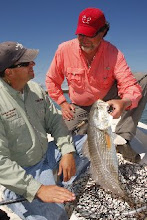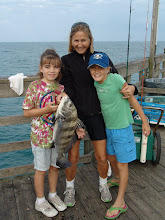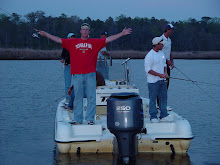‘Visiting’ fishermen say gamefish protection would benefit coastal tourism and economies
Out-of-state tournament fishermen promise they won’t return until net conflicts are resolved; tournament trail eliminates annual visit
By Jerry Dilsaver
Even in the current depressed economy, fishermen plan their vacations around catching fish. It’s the opinion of many fishermen that North Carolina is losing out on plenty of tourist dollars that could wind up in the state’s economy if the legislature designates red drum, speckled trout and striped bass as gamefish.
Proponents of gamefish status for those three species believe that having them in abundance would be good for economies in coastal areas, that a healthy recreational fishery would bring more anglers to North Carolina, creating jobs and providing an economic boost. This belief is shared by many fishermen from North Carolina and other states. What is certain is that constant conflict over saltwater fisheries is in no way positive, and several fishermen whose travels to the coast have been changed have no problem explaining why North Carolina won’t be a destination until the situation changes.
James McManus of Sylva, N.C., guides fishermen in several lakes, rivers and streams in North Carolina’s western mountains and is a former competitor on the Inshore Fishing Association (IFA) redfish tour. He enjoys fishing for red drum and speckled trout and would like to do more of it in North Carolina, but his experiences on the IFA Tour have him heading to Florida for his red drum and speckled trout.
“I am a North Carolina citizen and would love to fish here more, but I can’t take the chance that I could drive from the mountains and then find my fishing area wrapped up in nets or fished out when I arrive,” McManus said. “I go tuna fishing on the Outer Banks once or twice a year, and I would love to take my bay boat down and stay a few extra days. However, the fishing is too uncertain for the expense and taking time off work.
“When I vacation, instead of heading for the North Carolina coast, I pack up my family and drive to Steinhatchee, Fla.,” McManus said. “Florida gave gamefish status to red drum about 20 years ago and doesn’t allow gill nets in inshore waters. I can go there and fish unobstructed water and catch fish. It’s a longer drive and costs more, but it’s well worth it.”
Rob Beglin of Pawley’s Island, S.C., is another IFA redfish pro who has had some negative experiences fishing tournaments in North Carolina. He said he doesn’t plan to return to North Carolina until the fishery laws change.
“The North Carolina coast reminds me of Louisiana, and I was expecting a fishery that was similar when I first went there for a tournament several years ago,” Beglin said. “My fishing partner and I went a week early to familiarize ourselves with the waters and locate some fish and were happy the night before the tournament. We found some upper-slot reds in a bay on Wednesday, and they were still there Thursday and Friday, so we felt good about our chances for the tournament.
“When we got to the shallow bay on Saturday morning, it was criss-crossed with nets, and a commercial fisherman was at the mouth crossing back and forth as if to dare us to try to go in,” Beglin said. “We left and didn’t challenge him. Later, someone told us the fisherman was probably fishing for flounder. We said ‘No way’ to that. We had fished there Wednesday, then went back Thursday and Friday just to be sure the fish were still there, and (we) never caught a flounder. We catch some flounder fishing for reds, but hadn’t there. That bay was loaded with 25- to 27-inch redfish.”
Beglin said that in September 2011, he was in contention for Angler of the Year honors in the IFA’s Atlantic Division, and against his better judgment, he and his partner returned to North Carolina try to win the division. This time, they didn’t find the fish until Thursday, but again on Saturday morning, a netter had several nets spanning the bay.
“Fish had been scarce this year, so we decided to try and fish the mouth of the bay and catch fish that would be leaving,” Beglin said. “We managed to catch one nice fish, but found out where the others were later in the morning. When the netter picked up his nets, they were loaded with redfish, and they were large enough we could hear them thumping as they hit the deck. I was told the netter’s limit was 10 fish, but this fishermen put many more than that in his boat, and we never saw him throw any back.
“That afternoon after weigh-in and awards, I voiced how upset I was to the IFA officials, and several other fishermen had similar stories,” Beglin said. “I told them I wouldn’t fish in North Carolina again until something was done. For 2012, they have eliminated the North Carolina tournament from the Atlantic Division. I enjoyed the Surf City area and hate that for them, but it needed to be done.”
Bart Schad, director of the IFA Redfish Tour, confirmed the IFA had restructured its trail for the 2012 season and did not have a tournament scheduled for North Carolina. IFA has brought tournaments to North Carolina the past five years and fished two there in 2008 – out of Beaufort and Surf City. Schad said he remembers some fishermen were upset about incidents while fishing tournaments in North Carolina.
“In restructuring the IFA Redfish Tour, we weren’t specifically looking to cut the North Carolina tournament out,” Schad said. “We reduced each division from three to two tournaments and added some regional tournaments for multiple divisions. The Surf City tournament had the lowest participation in the Atlantic Division for the past two years, and that was the basis for our decision. We know some of the fishermen had bad experiences, but the issue of nets and the pending gamefish status weren’t used in our decision. Perhaps those issues influenced the participation numbers, but we based our decision solely on participation.”
Chris Floyd, an IFA redfish pro from Charleston, said he had also made the decision not to return to North Carolina for any tournaments. He said he had made several trips to North Carolina for IFA tournaments and had commercial fishermen move in on large schools of drum he had found and disrupt his fishing. He said IFA officials knew he did not plan to return to after the Surf City tournament last fall. Floyd’s estimate was that 90 percent of out-of-state fishermen said they wouldn’t return to North Carolina for another tournament.
“I don’t really understand this,” Floyd said. “It was explained to me that the commercial fishermen can only land a few redfish, so why would they be allowed to wrap up a bay with nets and interrupt a tournament that brings 50 to 100 boats with anglers and family members? Most of the tournament fishermen arrive by Wednesday before the tournament on Saturday, and a good number are there for the entire week before to the tournament.
“The economics just don’t add up,” Floyd said. “When we go to a tournament, we are renting motels or cottages, spending money at restaurants, local tackle shops, doing entertainment things, buying gas for boats and trucks and spending money in many other ways. Then, when we finish the tournament, all the fish are let go to stay in the area. Certainly, this has to be worth more to the local economy than the few drum the commercial fishermen can sell.”
Bobby Sands is an avid fisherman who lived in several Gulf of Mexico states before retiring to Southport. He said he initially judged the area by all the estuary and marshes around it and thought the fishing would be as good as Texas and Louisiana. He said after several years here, he still thinks the fishery has the habitat to recover and prosper, but the fish badly need the protection of the gamefish bill to do it.
“I was living near Corpus Christi, Texas, in the 1980s when the inshore fishery there bottomed out.” Sands said. “It was in bad shape, but after less than 10 years with gamefish protection and no gill-netting for reds and trout, it became a premiere fishery. The entire Texas coastal lagoon now has excellent fishing, and Baffin Bay has become a place where 5-pound trout don’t even raise eyebrows, and 8- to 10-pounders are surprisingly common.
“Louisiana also had similar issues,” Sands said. “The demand for blackened redfish had all but destroyed the red drum populations in the Louisiana marshes. Now, after being protected for about two decades, the Louisiana marshes are once again actually the Sportsman’s Paradise they proclaim on their license plates. The limit for redfish is five per day, and the limit for speckled trout is 25. Here, our limits are a single redfish and four trout. That’s a big difference.
“I know that given the opportunity, the North Carolina fishery would rebound quickly and could be as good as either Louisiana or Texas, if maybe not better. We have the habitat; we just need the fish to be protected from the constant pressure of commercial fishing, and gamefish status would do that. We would also find the fish are worth a lot more to everyone in the area as a recreational fishery. Many of the guides in Texas and Louisiana are former commercial fishermen, and they will tell you they are far better off now than when they were fishing commercially.”



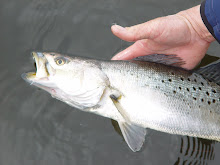



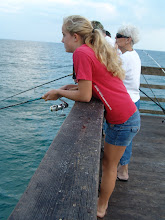

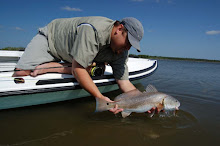.jpg)


